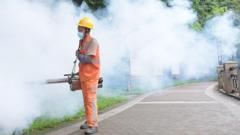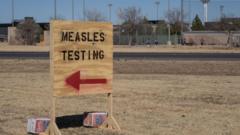The chikungunya virus outbreak has led China’s Guangdong province to adopt stringent health measures, as rising infections prompt severe responses reminiscent of past pandemics.
Chikungunya Virus Sees Surge in Guangdong, As China Implements Strict Measures

Chikungunya Virus Sees Surge in Guangdong, As China Implements Strict Measures
Over 7,000 cases reported in Guangdong since July; authorities emphasize aggressive actions to prevent further spread.
China's Guangdong province is facing a significant outbreak of the chikungunya virus, with more than 7,000 cases reported since July. The local authorities are now implementing strict measures, drawing comparisons to the stringent protocols established during the Covid-19 pandemic. In the city of Foshan, the epicenter of the outbreak, hospitalized individuals with chikungunya are kept isolated with mosquito nets over their beds and can only be discharged after testing negative or after a week in care.
Chikungunya, a virus transmitted through mosquito bites, leads to symptoms such as fever and debilitating joint pain, which can persist for extended periods. Historically uncommon in China, this outbreak mirrors the regular occurrences of chikungunya in South Asia, Southeast Asia, and parts of Africa. Alongside Foshan, at least 12 more cities in Guangdong are experiencing elevated case numbers, with nearly 3,000 reported just last week. The first case in Hong Kong—a 12-year-old boy who fell ill following travel to Foshan—was also confirmed.
Despite only mild cases reported thus far—with 95% of patients recovering in under a week—public anxiety has surged due to the obscurity of the virus. The U.S. health officials have advised travelers to exercise increased caution when visiting China.
To mitigate the outbreak, authorities have pledged "decisive and forceful measures." Patients exhibiting symptoms like fever or rashes are encouraged to seek immediate hospital evaluations. Residents are being urged to eliminate stagnant water sources in their homes, with potential fines of up to 10,000 yuan ($1,400) for noncompliance. Innovative mosquito control measures include introducing "elephant mosquitoes" that prey on smaller species transmitting chikungunya and dispatching fish that consume mosquito larvae. Additionally, drones are being deployed to locate stagnant water.
Some neighboring cities briefly mandated a 14-day quarantine for travelers from Foshan, a measure that has since been rescinded. The drastic actions taken have incited debate among the public on their necessity, with social media reflecting skepticism reminiscent of earlier pandemic experiences.
Chikungunya symptoms usually emerge within 3-7 days of a mosquito bite. Besides fever and joint pain, individuals may also experience rashes, headaches, and muscle pain. Those most vulnerable to severe cases include infants, the elderly, and individuals with pre-existing medical conditions. While there is no curative approach, fatalities remain rare. First identified in Tanzania in 1952, chikungunya has since spread to over 110 countries. The World Health Organization continues to advocate for minimizing stagnant water as the most effective prevention method.





















